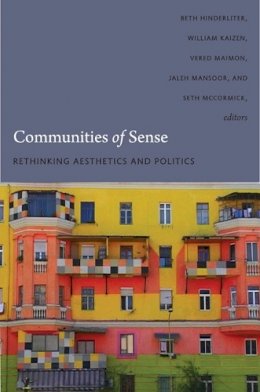
Communities of Sense: Rethinking Aesthetics and Politics
Beth Hinderliter
The first of the collection’s three sections explicitly examines the links between aesthetics and social and political experience. Here a new essay by Rancière posits art as a key site where disagreement can be staged in order to produce new communities of sense. In the second section, contributors investigate how sense was constructed in the past by the European avant-garde and how it is mobilized in today’s global visual and political culture. Exploring the viability of various models of artistic and political critique in the context of globalization, the authors of the essays in the volume’s final section suggest a shift from identity politics and preconstituted collectivities toward processes of identification and disidentification. Topics discussed in the volume vary from digital architecture to a makeshift museum in a Paris suburb, and from romantic art theory in the wake of Hegel to the history of the group-subject in political art and performance since 1968. An interview with Étienne Balibar rounds out the collection.
Contributors. Emily Apter, Étienne Balibar, Carlos Basualdo, T. J. Demos, Rachel Haidu, Beth Hinderliter, David Joselit, William Kaizen, Ranjanna Khanna, Reinaldo Laddaga, Vered Maimon, Jaleh Mansoor, Reinhold Martin, Seth McCormick, Yates McKee, Alexander Potts, Jacques Rancière, Toni Ross
Product Details
About Beth Hinderliter
Reviews for Communities of Sense: Rethinking Aesthetics and Politics
Joseph J. Tanke
Parallax
“[A] provocative and wide ranging exploration of Jacques Ranciere’s (2006) controversial assertion that ‘politics is aesthetic in principle’ (p. 58) Although focusing largely on the discipline of art history, Communities also has a broad appeal for those interested in the connections between aesthetic philosophy, social theory, and art practices. Bookended with provocative essays by Ranciere and Etienne Balibar, the collection offers new insights into contemporary art, aesthetic theory, global citizenship, postcolonialism, architecture, and film studies. Just as Ranciere’s own writings encourage interdisciplinary hybridization that challenge canonical divisions between disciplines, so too the form of Communities embodies this fundamental political and scholarly commitment.”
Tyson E. Lewis
Teachers College Record
